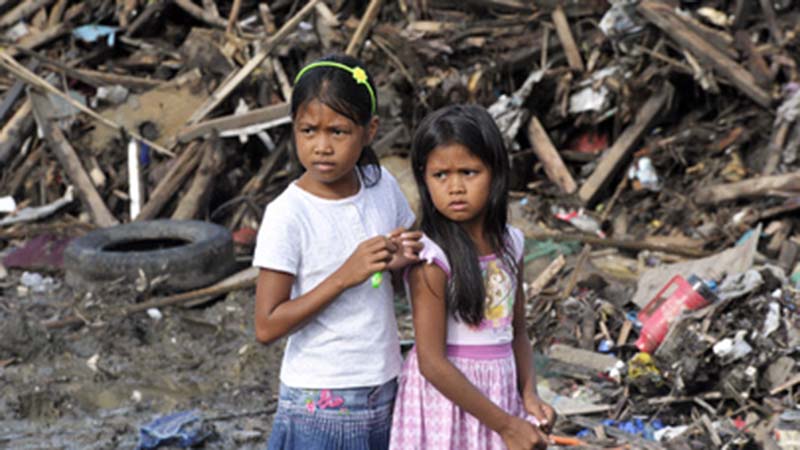Philippines investigators have summoned 47 corporate polluters to answer allegations of human rights abuses.
The Commission on Human Rights is calling fossil fuel and cement companies to account for the role of their products in causing global warming – and the harm that follows.
ExxonMobil, Chevron and BP are the top targets, based on the greenhouse gas emissions from burning their oil since pre-industrial times.
They have 45 days to respond to a petition brought by Greenpeace Southeast Asia and 13 other campaign groups.
It is not a court case and the carbon giants, collectively responsible for a fifth of historic emissions, are not on the hook for damages.
Rather, the companies are asked to explain how they plan to make up for their polluting legacies. After hearing the evidence, the Commission will report its findings.
“Ultimately, those who have profited most from pumping carbon dioxide into the atmosphere must bear the burden of preventing the havoc already being wreaked by climate change,” said Greenpeace chief Jennifer Morgan. “This is the first step in that process.”
Weekly briefing: Sign up for your essential climate politics update
ExxonMobil and Chevron have consistently dismissed shareholder concerns about climate change. The once-mighty coal producer Peabody has gone bankrupt.
Others on the list, including BP and Shell, have made more efforts to present themselves as part of the solution. At time of writing, neither had responded to a request for comment.
It remains to be seen whether these companies, with headquarters all over the world, will recognise the Commission’s jurisdiction.
The petitioners believe the Commission has a mandate to investigate any business that has an impact on the Philippines, regardless of whether it operates there.
“Businesses must be mindful of the long-term and far-reaching impacts of their operations on the human rights of people anywhere in the world,” said Greenpeace lawyer Kristin Casper.
As well as probing corporations, the Commission has a brief to monitor the ways human rights are threatened by climate change domestically.
The Philippines accounts for less than 1% of global emissions, yet is one of the most vulnerable countries in the world to weather disruption.
A case in point is Typhoon Haiyan, one of the strongest storms ever recorded, which killed more than 6,000 people in 2013.
Global warming is expected to make tropical storms more intense, while rising sea levels put coastal communities at higher risk from storm surges.
“We’ve been affected for so long by storms, droughts… by extreme weather, now made worse by climate change,” said petitioner Veronica “Derek” Cabe in a statement.
“We want those most responsible to be held accountable. We want justice and to regain the ability to protect the little that we have left for our children.”
It is also a dangerous place to oppose fossil fuel development. Cabe is from the province of Bataan, where anti-coal activist Gloria Capitan was shot dead by unidentified attackers on 1 July.
